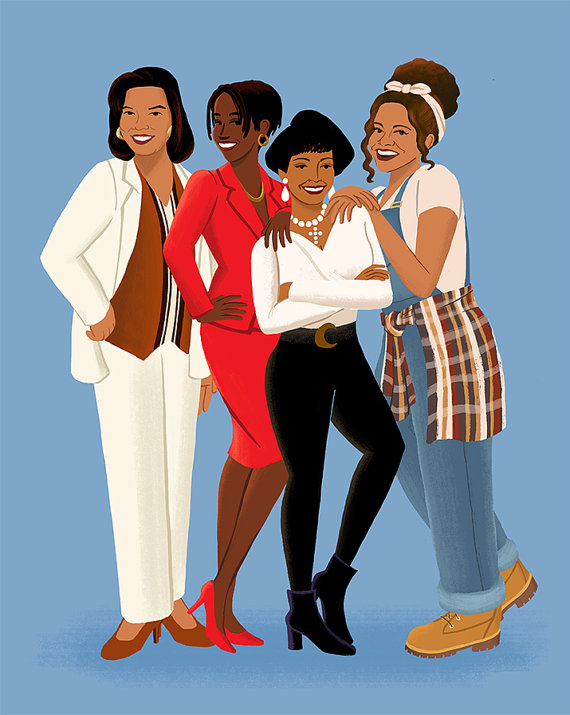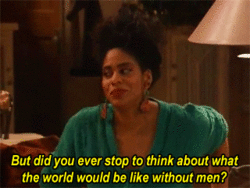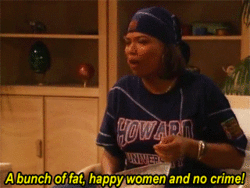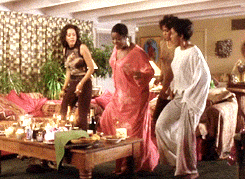Womanism: “Also: A woman who loves other women, sexually and/or nonsexually. Appreciates and prefers women’s culture, women’s emotional flexibility (values tears as natural counterbalance of laughter), and women’s strength. Sometimes loves individual men, sexually and/or nonsexually. Committed to survival and wholeness of entire people, male and female. Not a separatist, except periodically, for health.”[1]
A close friend told me being a Black woman is like being in a secret club of magic, sisterhood and friendship. Reflecting on Black women’s friendship and sisterhood on television and movies in the 90s, I, similarly see a consistent theme of support, unconditional love and acceptance. These themes can be aligned to how Alice Walker describes a Black feminist in her definition of Womanism. Walker describes Womanism as young girl as “girlish” or “womanish” or a black feminist or feminist of color. I find her description of Womanism as a means to provide a specific exploration into the lives of Black womanhood.
 I look specifically to Walker’s second definition because it captures the essence of the 90s Black woman who aims to take on the responsibility to be in charge of herself and to question the world around her. I reference how this can be explored in the hit show Living Single and the hit movie and book Waiting to Exhale. I utilize Walker’s second definition to explore how these women embody the spirit of being a womanist through the ways their characters interact with each other and how they stand alone as independent Black women loving and living in the 90s.
I look specifically to Walker’s second definition because it captures the essence of the 90s Black woman who aims to take on the responsibility to be in charge of herself and to question the world around her. I reference how this can be explored in the hit show Living Single and the hit movie and book Waiting to Exhale. I utilize Walker’s second definition to explore how these women embody the spirit of being a womanist through the ways their characters interact with each other and how they stand alone as independent Black women loving and living in the 90s.
Looking at the lives of Khadijah James, Synclaire James, Regina Hunter and Maxine Shaw, Living Single explores the lives of four independent Black women in New York City. This show captures the “everydayness” of single Black women in New York who validated each other, dealt with love and relationships and enjoying each other’s company.
With each woman having their own characteristics and identities, each woman on the show had an important role in each other’s lives. Khadijah and Regina were childhood friends who supported each other when things got tough. This support and commitment were also fluid in Khadijah and Synclaire’s relationship as cousins who she employed at her own Hip-Hop magazine called “Flava”.

Maxie and Khadijah were college friends from Howard University and Maxie seemed to always be the advocate for strong independent Black women amongst her friends. Their friendship supports Walker’s definition because of the characters emotional flexibility, their commitment to women’s empowerment and their tough bond as friends that were seamlessly interconnected, through the best and worst of times.
Walker does a great job discussing the emotional and spiritual effort that goes into being a Womanist. Walker explains how Womanist appreciates women’s culture, loves women sexually and non-sexually and values a woman’s strength and weaknesses[2]. This is where the women in Terry McMillian’s Waiting to Exhale fit this definition. Savannah Jackson, Bernadine Harris, Robin Stokes and Gloria Matthews experienced tough trials of love, life and men. Through their experiences, the women supported each other through it all. There were words of affirmation and emotional support that showed people like Bernadine who was going through a terrible divorce that her friends were by her side.
 I see Walker’s womanism as describing the social interactions, spiritual activism and critical thought that Black women do to uplift all people regardless of sexuality or gender. I understand this definition as a way to look at Black women’s liberation and healing of the self. Specifically, acting “womanish” seems to be a central theme in Waiting to Exhale. The four women were searching for answers to love, family and womanhood which is where I found the connection with Walker’s definition. This can be seen in Robin’s way of how she seemed to date the wrong men, but tried to see the best in them because she had love to give. Walker added the importance that a Womanist was not a separatist, but only in the occasion that Black woman in the 90s needs to repair her health. Gloria symbolizes the friend who represented self-care as a hairstylist and made sure her friends were always taking care of themselves, even if she didn’t want to do the big chop on Bernadine.
I see Walker’s womanism as describing the social interactions, spiritual activism and critical thought that Black women do to uplift all people regardless of sexuality or gender. I understand this definition as a way to look at Black women’s liberation and healing of the self. Specifically, acting “womanish” seems to be a central theme in Waiting to Exhale. The four women were searching for answers to love, family and womanhood which is where I found the connection with Walker’s definition. This can be seen in Robin’s way of how she seemed to date the wrong men, but tried to see the best in them because she had love to give. Walker added the importance that a Womanist was not a separatist, but only in the occasion that Black woman in the 90s needs to repair her health. Gloria symbolizes the friend who represented self-care as a hairstylist and made sure her friends were always taking care of themselves, even if she didn’t want to do the big chop on Bernadine.
Furthermore, the importance of Walker’s definition and the analysis of Black woman’s thoughts and feelings will better aid to the mental and emotional health and well-being where the Black woman can adequately take care of others and themselves in shows like Living Single and Waiting to Exhale. The womanist identity and the importance of Black women’s “everydayness” in the 90s was significant, interesting and relevant to highlighting the ugly and the beautiful of what it means to be a Black woman. These women work on coming into their own and being Black adult women who may not have it all figured out. But with the power of resilience, self-love and love for each other, the magnitude and power of their friendship kept them moving forward. — Adeerya J.
Citations
[1]Walker, A. (2006). Womanist. In L. Phillips, The Womanist Reader (p. 19). New York: Routledge.
[2]ibid.

